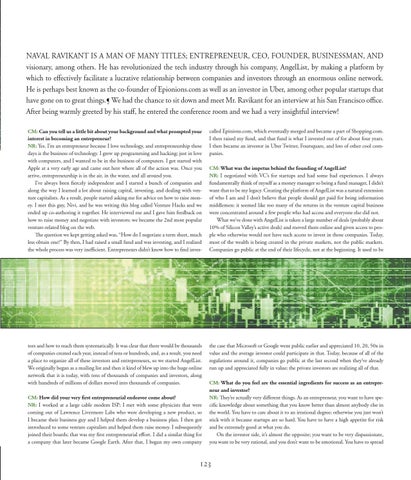NAVAL RAVIKANT IS A MAN OF MANY TITLES; ENTREPRENEUR, CEO, FOUNDER, BUSINESSMAN, AND visionary, among others. He has revolutionized the tech industry through his company, AngelList, by making a platform by which to effectively facilitate a lucrative relationship between companies and investors through an enormous online network. He is perhaps best known as the co-founder of Epionions.com as well as an investor in Uber, among other popular startups that have gone on to great things.¶ We had the chance to sit down and meet Mr. Ravikant for an interview at his San Francisco office. After being warmly greeted by his staff, he entered the conference room and we had a very insightful interview! CM: Can you tell us a little bit about your background and what prompted your interest in becoming an entrepreneur? NR: Yes. I’m an entrepreneur because I love technology, and entrepreneurship these days is the business of technology. I grew up programming and hacking; just in love with computers, and I wanted to be in the business of computers. I got started with Apple at a very early age and came out here where all of the action was. Once you arrive, entrepreneurship is in the air, in the water, and all around you. I’ve always been fiercely independent and I started a bunch of companies and along the way I learned a lot about raising capital, investing, and dealing with venture capitalists. As a result, people started asking me for advice on how to raise money. I met this guy, Nivi, and he was writing this blog called Venture Hacks and we ended up co-authoring it together. He interviewed me and I gave him feedback on how to raise money and negotiate with investors; we became the 2nd most popular venture-related blog on the web. The question we kept getting asked was, “How do I negotiate a term sheet, much less obtain one?” By then, I had raised a small fund and was investing, and I realized the whole process was very inefficient. Entrepreneurs didn’t know how to find inves-
tors and how to reach them systematically. It was clear that there would be thousands of companies created each year, instead of tens or hundreds, and, as a result, you need a place to organize all of these investors and entrepreneurs, so we started AngelList. We originally began as a mailing list and then it kind of blew up into the huge online network that it is today, with tens of thousands of companies and investors, along with hundreds of millions of dollars moved into thousands of companies. CM: How did your very first entrepreneurial endeavor come about? NR: I worked at a large cable modem ISP; I met with some physicists that were coming out of Lawrence Livermore Labs who were developing a new product, so I became their business guy and I helped them develop a business plan. I then got introduced to some venture capitalists and helped them raise money. I subsequently joined their boards; that was my first entrepreneurial effort. I did a similar thing for a company that later became Google Earth. After that, I began my own company
called Epinions.com, which eventually merged and became a part of Shopping.com. I then raised my fund, and that fund is what I invested out of for about four years. I then became an investor in Uber Twitter, Foursquare, and lots of other cool companies. CM: What was the impetus behind the founding of AngelList? NR: I negotiated with VC’s for startups and had some bad experiences. I always fundamentally think of myself as a money manager so being a fund manager, I didn’t want that to be my legacy. Creating the platform of AngelList was a natural extension of who I am and I don’t believe that people should get paid for being information middlemen; it seemed like too many of the returns in the venture capital business were concentrated around a few people who had access and everyone else did not. What we’ve done with AngelList is taken a large number of deals (probably about 10% of Silicon Valley’s active deals) and moved them online and given access to people who otherwise would not have such access to invest in those companies. Today, most of the wealth is being created in the private markets, not the public markets. Companies go public at the end of their lifecycle, not at the beginning. It used to be
the case that Microsoft or Google went public earlier and appreciated 10, 20, 50x in value and the average investor could participate in that. Today, because of all of the regulations around it, companies go public at the last second when they’ve already run up and appreciated fully in value; the private investors are realizing all of that. CM: What do you feel are the essential ingredients for success as an entrepreneur and investor? NR: They’re actually very different things. As an entrepreneur, you want to have specific knowledge about something that you know better than almost anybody else in the world. You have to care about it to an irrational degree; otherwise you just won’t stick with it because startups are so hard. You have to have a high appetite for risk and be extremely good at what you do. On the investor side, it’s almost the opposite; you want to be very dispassionate, you want to be very rational, and you don’t want to be emotional. You have to spread
123
